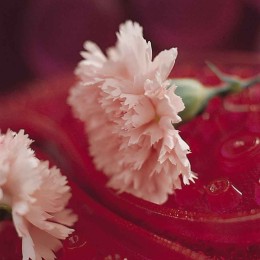
info about the flowers & plants association |
| the latest events in the flower world |
view the latest flower fashion trends |
green & gorgeous – boost your wellbeing with houseplants |
advice on where to buy & recommended retailers |
data & details about the flower industry |
how
to join and what benefits we can offer you as a member |
for
journalists & the media – what we can do for you |
index
of pages on this site to aid your navigation |
|
Carnation
Name: Dianthus, its
botanical name, means divine flower. Carnation was the flesh-pink colour Elizabethan
portrait painters used as a background wash. Description: The carnation is available as a standard carnation - one large flower per stem, or a spray carnation with lots of smaller flowers. Colour: Available in a huge range of colours, almost all except blue. A mauve carnation with a blue tinge has been developed by Florigene in Australia. But they look best in hot Latin shades of red, pink and orange. Availability: All year round. Varieties: New varieties have been bred which look like old-fashioned garden pinks, but in bright colours. They have daintier relatives, the fantastically fragrant Sweet Williams and Pinks. Care Tips: Carnations can last up to three weeks but should be kept away from ripening fruit and vegetables because of ethylene gas. Trivia: Facts: Carnations are the UK's best-selling cut flower, by miles. They are an excellent cut-flower, great value, very long-lasting, Since the 1950's they have been frowned upon by the style gurus, but are now making a comeback. Folklore: Used on mothering Sunday. In Canada you wear a red flower if your mother is alive or a white flower if your mother has died. Language of Flowers: Red carnation for "alas for my poor heart", striped for refusal, yellow for disdain, pink for woman's love.
| |
|
|
